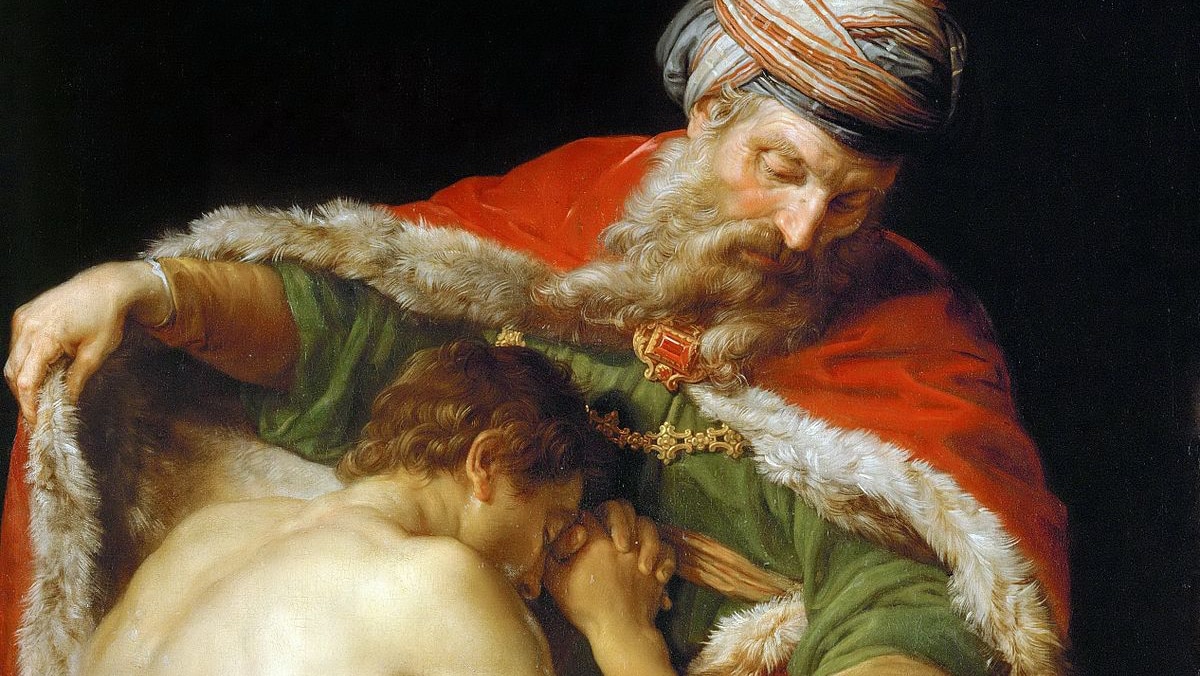More than any other, perhaps, the parable of the prodigal son reveals to us an aspect of the heart of the Father in the only way we, mere human beings, can understand it. For this reason, then, we ought to resist the habitual tendency that we all have of placing our minds and hearts in the déjà vu mode. “I have heard it many times before; I know the ending already.” Rather, let me share with you some insights that might have failed to register with us thus far in our life.
The subtitle of this parable could be: “A father had two sons. He lost them both: the younger of the two for awhile and the older one might still be lost…” This is the only parable, as far as I can tell, which has no ending. The ending is up to each one of us to write as the Father leaves us free to choose.
What must strike us about our Father is his silence. He respects our freedom anyway we might choose to use it—or abuse it. Thus, the first thing that should give us pause is the Father’s vulnerability in deciding to call us to life.
Freedom is the prerequisite, sine qua non, for love. Love cannot be forced upon anyone. Love has always to be a free response. It is love only to the extent that it is free.
The younger son voices his outrageous and cruel demand; but the Father remains silent although he hears the unspoken words of his younger son: “to me you are dead already; I have to move on with my life.”
His heart is suddenly held in a vise grip. He could voice his displeasure, his hurts. He could refuse the request. He could discipline his son and bar the exit door of the Home.
But our Father is forever a Father prompted by love. He opts to let us learn and grow also when our choices are foolish and totally wrong. He chooses to be the light of our path, the compass pointing towards Home, the memory of the warm and safe place that is always waiting for our return.
As we contemplate the heart of the Father, hopefully, we begin to realize that we might keep assigning too little value to ourselves. We might be forgetting that the Father assigns to each one of us the unlimited value of the Blood of his Son Jesus. Therefore, the Father will never be resigned to losing a single one of his wayward children. From the moment we leave Home, the Father follows us with his thoughts and “unsettles” us by placing a burning desire in our hearts.
Now, all this is quite comforting, but it might be only remotely relevant to us for the simple reason that, as we claim, we have not left our Father’s Home, barring very few exceptions of “real sinners” in our midst. Yet, this, most likely, is the silent tragedy that we are living in many ways similar to the tragedy lived by the older son.
I know that most of you won’t take me seriously when I talk of our life as being, possibly, unfolding as a spiritual tragedy. But it might indeed be so!
With a few strokes, Jesus paints the tragedy lived out by the older son. His level of habitual resentment due to the weight of slaving away in the fields for many years, mixed with intense bitterness since the Father was so weak as to give in to the demand of his younger brother is such that he has thoroughly destroyed any blood relations.
Wouldn’t you call that a tragedy?
That explosive mixture of resentment and bitterness makes it impossible for him to utter the word “Father;” a word found repeatedly on the lips of his younger brother. He has not a father but a master for whom he slaves away‘Look, all these years I served you and not once did I disobey your orders.’ Luke 15:29 He has no brother either: But when your son returns who swallowed up your property with prostitutes, for him you slaughter the fattened calf.’ Luke 15:30
He becomes angry because, in his eyes, the Father is totally unfair to him; hence, he refuses to enter the house which he has yet to consider home since the first of those long years of slaving away for an unreasonable and doting master. He is also unmoved by his Father’s pleading with him to enter the home and join in the festivities.
It is a tragedy. And it remains a tragedy unless the older son has a complete change of heart which seems quite improbable.
Nowadays it is still the absurd tragedy of attempting to live a Christian calling without love. It is still a tragedy because some opt to live without loving, unmindful that heaven is simply and exclusively love, endless love, given, received and celebrated in the eternal Home open to all of God’s children.
Today, not tomorrow, not in a week, we have to identify which aspects of our life are lived without love; which obligations are carried out by us as a burden; and whether resentment spoils our days and makes our nights sleepless. For some of us it might be simpler to name those people whom we truly love; not those whom we find useful, convenient to have around, helpful, ready to come to our rescue, but those whom we hold as more important than ourselves and whose wellbeing we place ahead of our own.
It becomes patently clear that we should not limit the number of those whom we consider our brothers and sisters. Nor should we deny our Father the right to act as a Father for all.
None of us is righteous (cf. Matthew 7:11) hence, living with the conviction of being righteous is worse than not being righteous. Furthermore, it is not enough not to leave Home; we are called to make it a Home by relating lovingly to our Father and to all his children and by participating wholeheartedly in every Eucharistic celebration set up by him. This is the love that should mark every aspect of our life on earth while waiting for the celebration that will never end.








